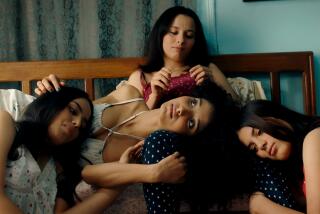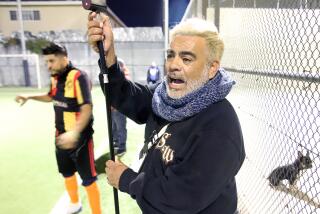In Kadafi’s Libya, even soccer was ruthless
It is one of Libya’s oldest and most venerable institutions, predating not only Moammar Kadafi’s rule but independence in 1951, and boasting what is perhaps the country’s most fervent fan base.
But in a police state where soccer served as a substitute for resistance, the lads from the Al Ahli sports club angered the wrong crowd: Kadafi and his soccer-besotted son, Saadi.
The club paid a steep price: Its grounds were demolished, its signature Al Ahli Benghazi soccer team was dissolved, its red-and-white colors were removed from public display. Dozens of supporters were sent to prison, with some sentenced to death for subversion.
It was akin to someone abruptly disbanding the Dodgers, razing Chavez Ravine and outlawing the wearing of Dodger-blue caps, jackets and T-shirts.
The story of Kadafi’s bludgeoning of Al Ahli offers a look at the obsessive and often ruthless behavior of a regime long closed to international scrutiny, of a leader so megalomaniacal that he forbade sports broadcasters from using players’ names, demanding that they be referred to only by their numbers lest they become too popular.
Although Kadafi crushed the club 12 years ago, the rebel triumph here in the east has afforded fans and others the freedom to speak openly for the first time about the still-raw episode.
“Our club has always been very emotional; we have very passionate fans,” said Khalifa Binsraiti, a longtime club official who went to jail during the crackdown. “But it was sport. No one ever imagined it would come to this.”
The saga centers on Saadi Kadafi, a family bad boy often photographed in designer shades.
Few things anger Libyans more than what many view as the arbitrary authority wielded by Kadafi’s sons, widely feared power brokers with unrestricted checkbooks, access to goon squads and a taste for lavish lifestyles.
Saadi is a noted soccer enthusiast and business dabbler with a history of excess. A 2009 U.S. diplomatic cable about Kadafi’s “famously fractious” offspring, disclosed by WikiLeaks, labeled him “notoriously ill-behaved” and known for his “excessive partying” and “scuffles with police in Europe.”
Alas, Saadi’s soccer abilities didn’t measure up to his passion for the game.
“Saadi was never much of a player,” said Zain Abidin Burkan, a prominent sports journalist here. “But in the end, it didn’t matter. His name was Kadafi.”
In the late 1990s, the young Kadafi adopted a leading Tripoli team, also called Al Ahli. He became a player, captain, de facto manager and owner. And at the same time, he also headed the national football federation, becoming Libya’s soccer czar.
“It was a complete corruption of the sport,” says Burkan, a thin, jittery figure still outraged by the audacious conflict of interest.
Inevitably, Saadi’s close identification with the Tripoli club meant that its fortunes became entwined with the leadership’s prestige.
Saadi’s team evolved into a powerhouse. He was able to buy the best players and, when needed, to bribe and bully referees and linesmen into making calls favoring his team, Burkan and others say.
“The referees were always against us,” says Nasser Mohammed, 38, an Ahli Benghazi fan who slings cappuccino at a popular cafe in a country where quality coffee is one bequest of the long-ago Italian occupation. “Anything to make us lose.”
During one national cup final match in Benghazi, witnesses say, Saadi and his team were mercilessly booed in front of a crowd featuring several dignitaries from sub-Saharan Africa, a region where his father was seeking to extend his influence. Afterward, Saadi was apoplectic.
“I will destroy your club!” Binsraiti, then Al Ahli’s soccer chief, says he was told by an irate Saadi after that match. “I will turn it into an owl’s nest!”
Saadi’s drive for revenge, fans say, came to a head at a crucial match in July 1999.
Al Ahli needed a victory against another team, Al Akhdar, to avoid being demoted to the second division, a profound blow for a proud franchise. The first half ended in a 0-0 draw.
But in the second half, a questionable penalty was called against Al Ahli; its opponent was awarded a penalty kick that would probably break the deadlock. Fans erupted in collective indignation. The coach confronted the referee, allegedly shoving him. Spectators stormed the pitch. The game was suspended. A loss for Al Ahli.
The fuming Al Ahli faithful mounted a march downtown, shouting slogans denouncing Saadi. The angry mob set fire to the building of the national soccer federation. They also burned a likeness of Moammar Kadafi, a grievous offense.
“I was ready to die that day, I was so frustrated,” says Ali Ali, 48, a businessman who was among the enraged crowd. “We were all ready to die.”
Plainclothes security men soon began arriving at the homes of rioters. About 80 people were arrested, witnesses say. Most were soon released, but about 30 were sent for trial in Tripoli.
Apart from vandalism and destroying public property, the charges included more ominous allegations: contacts with dissidents abroad, a capital offense.
Trials were held. Three of those declared guilty were handed death sentences. At the eleventh hour, however, it was announced that Kadafi the merciful had intervened. He commuted the capital cases to life in prison. The three ultimately served five years in custody.
Benghazi’s club was no more. People here believe that Kadafi personally ordered the bulldozing of the Al Ahli facilities, a once-buzzing 15-acre compound where professional, amateur and casual athletes used to train and people from throughout town came to socialize.
Fans mourned as if they had lost a loved one.
“I love football, but I couldn’t have anything to do with it after that experience,” says Mohammed, the barista, who was jailed for more than a month. “The sport was dead for me.”
Saadi went off to play in Europe. He spent only a few minutes on the field for an Italian club, Perugia, before failing a drug test and being bounced. He later resurfaced with another Italian team. The joke here is that he is the only professional soccer player who paid to be on a team, rather than being paid to play.
In 2004, Al Ahli Benghazi was restored, initially as a second-division squad. The Kadafi regime never explained the club’s rehabilitation, but analysts here note that Saadi had moved on to other pursuits. The government even promised to help construct a new headquarters for Al Ahli; many doubted the sincerity of the offer.
On the edge of downtown Benghazi, the former grounds of the Al Ahli club remain a desolate expanse of battered grandstands, abandoned light posts and concrete rubble, a barren monument to the intersection of sports and politics in Moammar Kadafi’s Libya.
More to Read
Start your day right
Sign up for Essential California for news, features and recommendations from the L.A. Times and beyond in your inbox six days a week.
You may occasionally receive promotional content from the Los Angeles Times.






